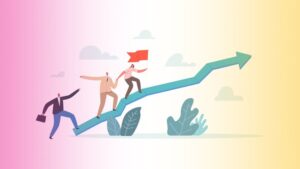The employment landscape is currently going through a significant transformation. This change is driven by a combination of factors, with technological advancements, especially in artificial intelligence (AI), playing a crucial role.
AI’s ability to automate repetitive tasks threatens to displace workers in industries heavily reliant on such processes, potentially leading to job losses and economic disruption, particularly in sectors that haven’t adapted their workforces for the changing landscape. AI, however, also brings new opportunities. To succeed in the modern job market, continuous learning and skill development have become essential for everyone.
This blog explores how AI is reshaping the job market and how training and coaching programs can empower employees to thrive in this evolving landscape.
Following are some key transformations through AI:
1. Automation of Routine Tasks: AI is taking over repetitive and routine tasks, changing job requirements and skill sets. Jobs that involve manual data entry, basic calculations, or repetitive processes are increasingly being performed by AI systems. As a result, workers need to acquire new skills that complement AI capabilities.
2. Emergence of New Roles: While some jobs may become obsolete due to automation, new roles are emerging. These roles often involve managing AI systems, analysing data, and developing AI algorithms. For instance, data scientists, machine learning engineers, and AI ethicists are in high demand.
3. Hybrid Skills: Professionals now require a combination of technical and soft skills. Technical proficiency in AI-related tools and programming languages is essential, but so are skills like critical thinking, creativity, adaptability, and leadership. The ability to collaborate effectively with AI systems is crucial.
4. Lifelong Learning: Continuous learning is now essential. Professionals must engage in lifelong learning to remain relevant. This includes formal education, online courses, workshops, and certifications. Employers increasingly value candidates who demonstrate a commitment to self-improvement.
Continuous skill development enables workers to adapt to changing demands and transition into new, AI-driven fields. Fostering adaptability and a growth mindset is crucial. The ability to quickly learn new things and embrace change will be essential for navigating the ever-shifting job market terrain. Coaching programs that emphasise these qualities can empower workers to stay ahead of the curve and remain competitive in the face of technological disruption.
Following are some ways training and coaching programs can help employees deal with the challenges created by changing skills requirements:
1. Reskilling and upskilling: Reskilling involves acquiring new skill sets to transition into a different career path, while upskilling focuses on expanding existing skills by adding new expertise.
Training programs are essential for reskilling and upskilling the workforce. Companies should invest in programs that help employees transition to new roles. These programs should cover technical skills related to AI and soft skills like adaptability and communication.
2. Leadership Involvement: Reskilling efforts should not be solely the responsibility of the HR department. Leaders and middle managers across the organisation must actively participate. They can champion the importance of continuous learning, allocate resources, and create a culture that encourages skill development.
3. AI-Powered Career Coaching: AI-powered career coaches have recently emerged. These digital tools analyse individual career paths, suggest personalised learning paths, and provide insights into industry trends. They help professionals navigate career transitions and make informed decisions.
In conclusion, the job market is experiencing rapid change. AI, while posing a threat of automation, also presents exciting new opportunities. By embracing lifelong learning, developing in-demand skills, and cultivating a growth mindset, individuals can survive and thrive in this dynamic environment. The future of work may be uncertain, but through continuous learning and adaptation, we can ensure that the human element remains central to the ever-evolving world of employment.







